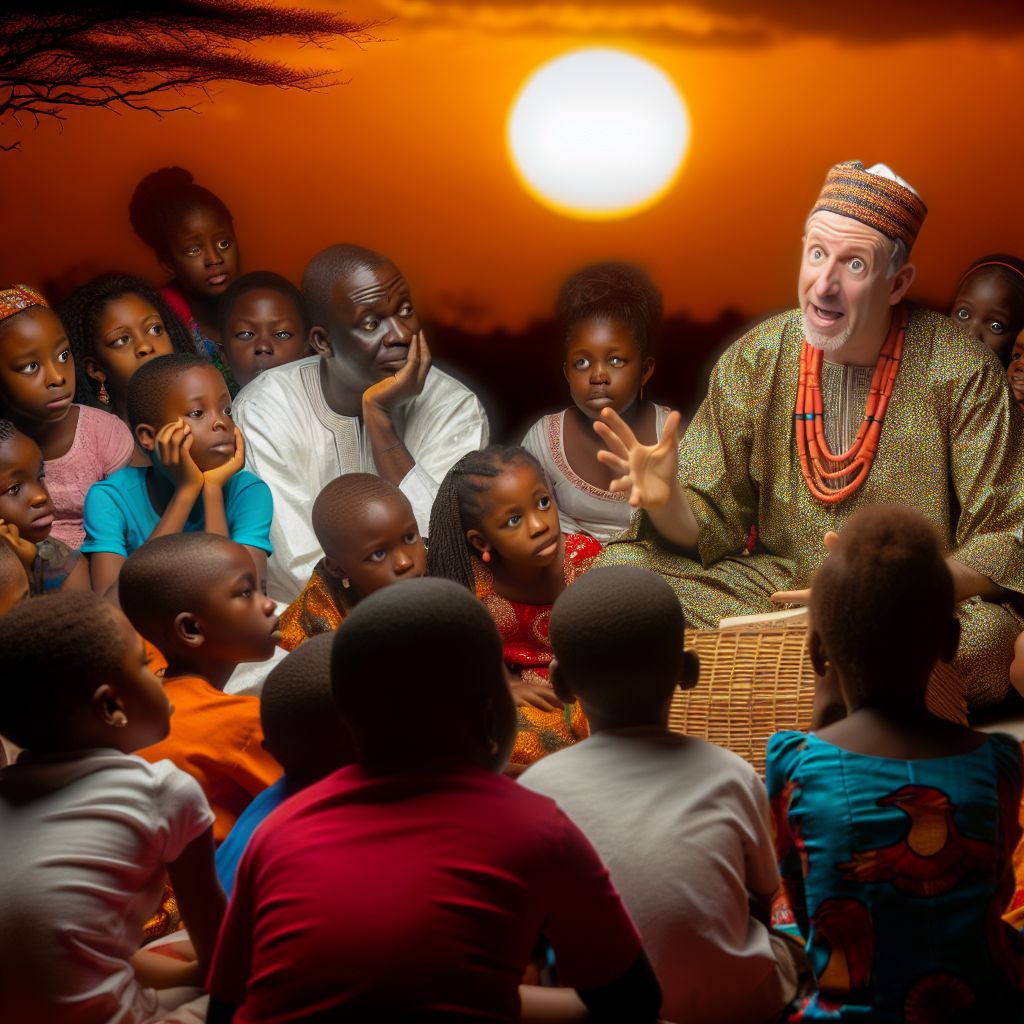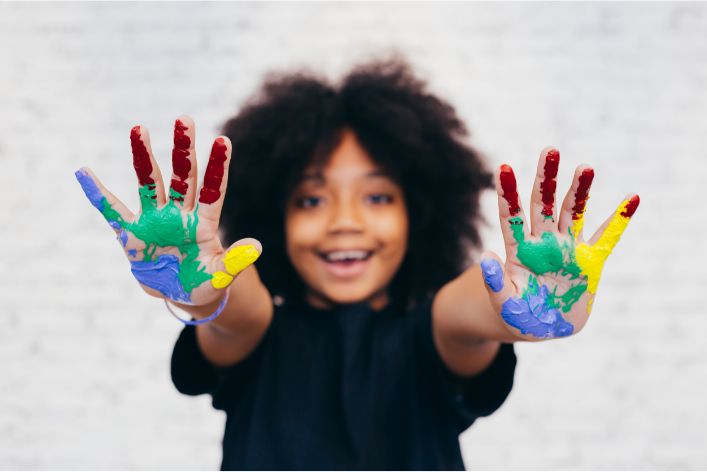Enhancing Language Skills through Traditional Narratives
Expanding Vocabulary through Rich Narratives
Nigerian folk stories introduce children to new vocabulary.
These narratives often include unique words and phrases.
Additionally, children learn contextual meanings through story context.
This exposure broadens their language repertoire significantly.
Improving Comprehension through Storytelling
Listening to folk tales enhances children’s comprehension skills.
They listen actively, following plots and characters closely.
This helps them develop critical thinking and inference skills.
Moreover, children learn to make connections between ideas.
Encouraging Expression and Communication
Nigerian folk stories encourage children to express themselves.
As they retell stories, they practice their speaking skills.
This practice builds confidence in their verbal communication.
Furthermore, storytelling sessions foster group discussions.
Understanding Cultural Context and Nuance
Folk stories provide insights into Nigerian culture and values.
Children gain a sense of identity through these narratives.
This understanding enriches their global perspective.
Parenting Made Just for You
Get personalized Parenting Solutions tailored to your child’s needs. Transform your parenting journey with expert guidance in 1-3 days.
Get StartedAdditionally, children learn about historical events and figures.
Cultural Identity and Heritage Preservation through Folk Stories
Building Cultural Awareness
Nigerian folk stories serve as vital tools for cultural awareness.
Children gain insights into diverse Nigerian cultures through these tales.
Each story reflects unique traditions and values passed down through generations.
Furthermore, these stories foster appreciation for cultural diversity.
Strengthening Family Bonds
Sharing folk stories creates bonding moments between parents and children.
Families gather to listen and narrate traditional tales together.
This shared experience nurtures a sense of belonging and identity.
Moreover, it strengthens intergenerational connections within families.
Encouraging Critical Thinking
Nigerian folk stories often present moral dilemmas and life lessons.
Children learn to think critically about choices and consequences.
The stories promote reflection on personal values and ethical decisions.
Consequently, children develop strong problem-solving skills.
Preserving Language and Oral Traditions
Listening to folk stories helps children learn local languages.
Unveil the Perfect Name that Tells Your Family's Story
Let us help you find a name that embodies your family's values, traditions, and dreams. Our personalized consultation weaves cultural insights to create a name that's uniquely yours.
Get StartedThese narratives keep linguistic traditions alive in a fun way.
Oral storytelling skills are vital for cultural preservation.
Sharing stories in native languages enhances cultural connectivity.
Inspiring Creativity and Imagination
Nigerian folk tales spark children’s imaginations and creativity.
The vivid characters and enchanting plots captivate young minds.
Children are inspired to create their own stories and interpretations.
This creativity fosters a love for literature and storytelling.
Moral Lessons and Values Imbibed from Nigerian Folk Tales
Importance of Integrity
Nigerian folk tales often emphasize the value of honesty.
Stories illustrate consequences faced by dishonest characters.
This teaches children the importance of maintaining their integrity.
The Value of Community
Many tales highlight the strength found in community bonds.
They show how working together leads to mutual success.
Children learn about the benefits of supporting each other.
Respect for Elders
Respect for elders is a recurring theme in folk stories.
Narratives portray the wisdom elders impart to younger generations.
Children discover the importance of valuing tradition and experience.
Understanding Consequences
Stories often depict the outcomes of characters’ actions.
These tales teach children that every decision has repercussions.
Thus, they become more mindful of their choices in life.
Courage and Resilience
Nigerian folk tales celebrate heroes who face challenges bravely.
Characters demonstrate resilience in overcoming adversity.
Such narratives inspire children to be courageous in their own lives.
Appreciation of Culture
Through these stories, children gain insight into Nigerian culture.
Themes reflect cultural beliefs, practices, and values.
This fosters a sense of pride and belonging in their heritage.
You Might Also Like: Encouraging Creativity with DIY Projects Using Local Materials
Stimulating Imagination and Creativity in Children
Exploring Rich Narratives
Nigerian folk stories capture the essence of culture and tradition.
These narratives feature vibrant characters and intriguing plots.
Children connect with the stories, sparking their imaginations.
Moreover, these tales often convey profound morals and lessons.
Encouraging Creative Expression
Listening to folk stories inspires children to create their own narratives.
They learn to express their thoughts in diverse ways.
This creative outlet aids in emotional development and communication skills.
Building Cultural Awareness
Introducing kids to Nigerian folk stories nurtures cultural appreciation.
Children gain insights into traditions and values different from their own.
Such exposure fosters empathy and global understanding.
Developing Critical Thinking Skills
Engaging with folk tales encourages children to think critically.
They analyze stories and discuss various interpretations.
This process sharpens their reasoning and analytical abilities.
Strengthening Family Bonds
Sharing folk stories creates meaningful family interactions.
Parents and guardians can bond with children over storytelling sessions.
These shared experiences build memories and strengthen relationships.
See Related Content: Low-Cost, High-Impact Family Fun Ideas for Nigerian Households
Building Family Bonds through Storytelling Traditions
The Value of Storytelling
Storytelling fosters strong connections among family members.
It encourages shared experiences and memories that last a lifetime.
Through stories, families can pass down important cultural values.
This practice nurtures a sense of belonging and identity.
The Role of Nigerian Folk Stories
Nigerian folk stories offer rich narratives filled with lessons.
These stories often feature vibrant characters and moral dilemmas.
Children can learn about bravery, wisdom, and the importance of community.
Moreover, they spark curiosity about Nigeria’s diverse cultures.
Enhancing Communication Skills
Telling folk stories engages children’s imaginations.
This engagement improves their verbal skills and confidence.
As children retell stories, they practice articulation and expression.
Furthermore, active participation enhances listening skills.
Creating Family Traditions
Integrating storytelling into family routines solidifies bonds.
Parents can set aside special times for reading and discussing stories.
This builds anticipation and excitement for family storytelling nights.
Such traditions instill values that children carry into adulthood.
Fostering Emotional Intelligence
Nigerian folk stories address complex emotions and situations.
By discussing characters’ feelings, children develop empathy.
This emotional understanding helps in navigating real-life challenges.
In turn, it promotes healthier relationships both inside and outside the family.
You Might Also Like: Creative Outdoor Games for Nigerian Kids That Don’t Break the Bank

Understanding Social Structures and Community through Folklore
The Role of Folklore in Culture
Nigerian folk stories serve as cultural pillars in communities.
They convey societal norms and values through entertaining narratives.
Children learn about their heritage and identity while enjoying these tales.
Moreover, these stories create a sense of belonging and connection.
Social Norms and Morals Reflected in Stories
Nigerian folklore often highlights essential moral lessons.
These narratives illustrate the importance of honesty, kindness, and respect.
Consequently, children adopt these values as they engage with the stories.
Additionally, these folk tales often depict communal life and cooperation.
Through storytelling, kids understand their roles within the society.
Fostering Discussion and Critical Thinking
Sharing folk stories encourages family discussions.
Parents and children can reflect on the lessons together.
This exchange promotes critical thinking about societal issues.
Furthermore, storytelling fosters a platform for different perspectives.
Kids learn to appreciate diverse viewpoints inspired by folklore.
Building Community Bonds
Nigerian folk tales strengthen community ties.
They bring families and neighbors together during storytelling sessions.
These gatherings enhance social cohesion and unity.
Furthermore, storytelling nurtures friendships among children.
As they listen and share stories, bonds are built and maintained.
Intergenerational Learning
Nigerian folklore facilitates intergenerational communication.
Older generations pass down stories to younger ones.
Consequently, children gain wisdom and insights from their elders.
This exchange fosters respect and appreciation for heritage.
Additionally, it ensures that cultural knowledge is preserved.
Gain More Insights: Affordable and Creative Indoor Activities for Nigerian Families
Encouraging Critical Thinking and Problem-Solving Skills
Engagement with Folktales
Nigerian folk stories captivate children’s imaginations.
These tales often present moral dilemmas and challenges.
As children listen, they begin to analyze situations.
They ponder the choices made by characters.
This sparks discussions about what they would do.
Connection to Cultural Context
Folktales provide insight into Nigerian culture and values.
Through storytelling, children learn about community and ethics.
This cultural backdrop encourages critical analysis of decisions.
Kids discover why certain actions are considered right or wrong.
Problem-Solving Scenarios
Many folk stories present complex problems to be solved.
Children identify the obstacles characters face.
They can brainstorm potential solutions together.
This collaborative effort fosters teamwork and communication.
Building Empathy and Perspective
Nigerian folk stories often highlight diverse perspectives.
Children learn to empathize with characters’ struggles.
This experience enhances their social skills and awareness.
As they share opinions, they practice articulating thoughts.
Encouragement of Creative Thinking
Listening to these tales inspires creative thought.
Children imagine their own endings or spin-off stories.
This freedom to interpret fosters innovation and creativity.
The process strengthens their ability to think outside the box.
Fostering Emotional Intelligence and Empathy through Character Experiences
Developing Emotional Awareness
Nigerian folk stories introduce children to complex emotions.
Characters often face challenges that elicit empathy.
For instance, a young character might lose a sibling.
This experience provides a safe space for emotional exploration.
Children can discuss their feelings in relatable contexts.
Understanding Different Perspectives
Nigerian tales often feature diverse characters and cultures.
Through these stories, kids learn about various life experiences.
For example, a story about a brave girl teaches courage and resilience.
This broadens their understanding of the world around them.
Ultimately, it cultivates appreciation for different backgrounds.
Encouraging Compassionate Actions
Characters in folk stories often model compassionate behavior.
Children can see the impact of kindness and generosity.
For instance, a character may share food with a stranger.
This encourages young readers to practice empathy in real life.
Stories inspire them to act compassionately towards others.
Building Communication Skills
Sharing stories encourages children to express their thoughts.
They learn to articulate their feelings and observations clearly.
Furthermore, discussing story plots fosters dialogue among peers.
This not only enhances verbal skills but also builds connections.
Consequently, children develop better social interactions.
Creating a Sense of Community
Nigerian folk stories often emphasize communal values.
They portray the importance of support and solidarity.
As children share stories, they connect with one another.
This reinforces a sense of belonging within a group.
Hence, kids learn the value of collaboration and teamwork.
Additional Resources
“The Danger of a Single Story” by Chimamanda Ngozi Adichie speech




